The Trade Union Talk (TUTok) was held on July 12, 2024, titled “Pagbangon ng Uring Manggagawa Sa Harap ng Pandaigdigang Neoliberal na Krisis” (Workers Rise against Neoliberalization). The School of Labor and Industrial Relations (UP SOLAIR) Auditorium served as venue for 120 workers and participants. The event took place from 1:00 PM to 4:30 PM and aimed to address the ongoing struggles and conditions faced by workers in the context of the global neoliberal crisis. The TUTok focused on the challenges faced by the working class amid the global neoliberal crisis. Key speakers addressed issues such as low wages, insufficient benefits, union recognition, and the poor labor rights situation in the Philippines. They discussed the impact of government policies, violence against workers, and the need for stronger social and collective action to improve workers’ rights and living conditions. The event emphasized the importance of unity and collaboration among various sectors to advocate for labor rights.
The program was opened by Gene Rodriguez, the Officer-in-Charge of EILER, who emphasized the necessity for continuous discourse and engagement regarding the situation and struggles of workers in light of the prevailing global challenges.
Workers’ Rights and Wages at Risk in the Philippines
Michael Bartolome (ED committee head of EILER) discussed the current state of labor, highlighting issues such as inadequate wages, benefits, and the lack of attention from the president to these concerns. He pointed out three main problems faced by the working class: low wages, job availability, and workers’ rights.
One of the primary concerns highlighted by Bartolome is the inadequacy of wages. He pointed out that the minimum wage is insufficient to meet even the basic living standards, indicating that many workers struggle to make ends meet. The real wage, which he noted is only 573, reflects a significant gap between what workers earn and what is necessary for a decent standard of living. This situation is exacerbated by the high productivity of labor in the Philippines, which contrasts sharply with the low wages being offered. Bartolome’s emphasis on this issue underscores the broader economic challenges that workers face, where the cost of living continues to rise while wages stagnate.
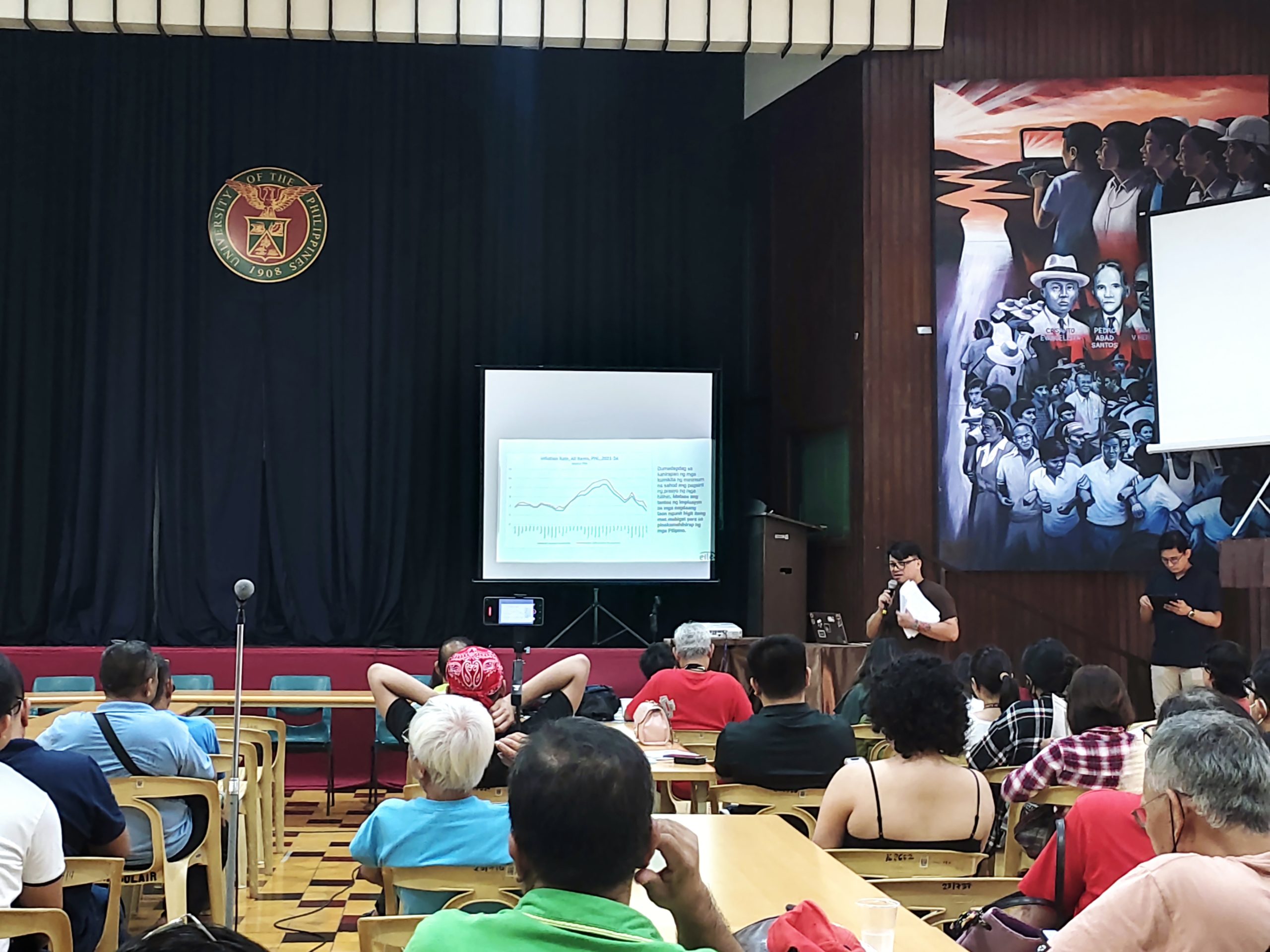
Michael Bartolome (ED committee head of EILER) discussed the current state of labor, highlighting issues such as inadequate wages, benefits, and the lack of attention from the president to these concerns. He pointed out three main problems faced by the working class: low wages, job availability, and workers’ rights.
Bartolome also addressed the issue of job availability, noting that the types of jobs being created are often limited to the growing service sector and are frequently seasonal in nature, such as those in construction. This creates instability for workers, as they may not have consistent employment throughout the year. Additionally, he pointed out the low participation of women in the labor force, which further complicates the job market dynamics. The lack of diverse and stable job opportunities contributes to the overall economic insecurity experienced by many workers.
The third major problem Bartolome identified is the workers’ rights. He highlighted that while there are laws intended to protect workers, these are often not enforced in practice. This lack of enforcement leads to a culture where workers’ rights are routinely violated, and issues such as red-tagging and violence against union members persist. Bartolome’s remarks reflect a broader concern about the systemic challenges that undermine the rights of workers, making it difficult for them to organize and advocate for better conditions.
Kamille Pauline Deligente (from CTUHR) presented the highlights of the Omnibus Guidelines on Freedom of Association, stressing the importance of social dialogue and the need to prevent the labeling of workers and unions, which has been a significant issue due to red-tagging and profiling.
One of the key points Deligente emphasized is the importance of social dialogue among tripartite stakeholders—workers, employers, and the government. The International Labour Organization (ILO) has been advocating for the Philippine government to strengthen this dialogue to effectively address labor issues. This approach is essential for fostering mutual understanding and cooperation, which can lead to more effective resolutions of conflicts and grievances within the labor sector.
A major concern that Deligente addressed is the issue of labeling workers, union members, and trade unions, which has been exacerbated by practices such as red-tagging and profiling. Red-tagging refers to the practice of labeling individuals or groups as communists or terrorists, often without substantial evidence, which can lead to violence and discrimination against them. This practice not only undermines the safety and rights of workers but also stifles their ability to organize and advocate for their rights. The Omnibus Guidelines explicitly state that no agency or stakeholder should engage in such labeling, aiming to protect the integrity and rights of workers and unions.
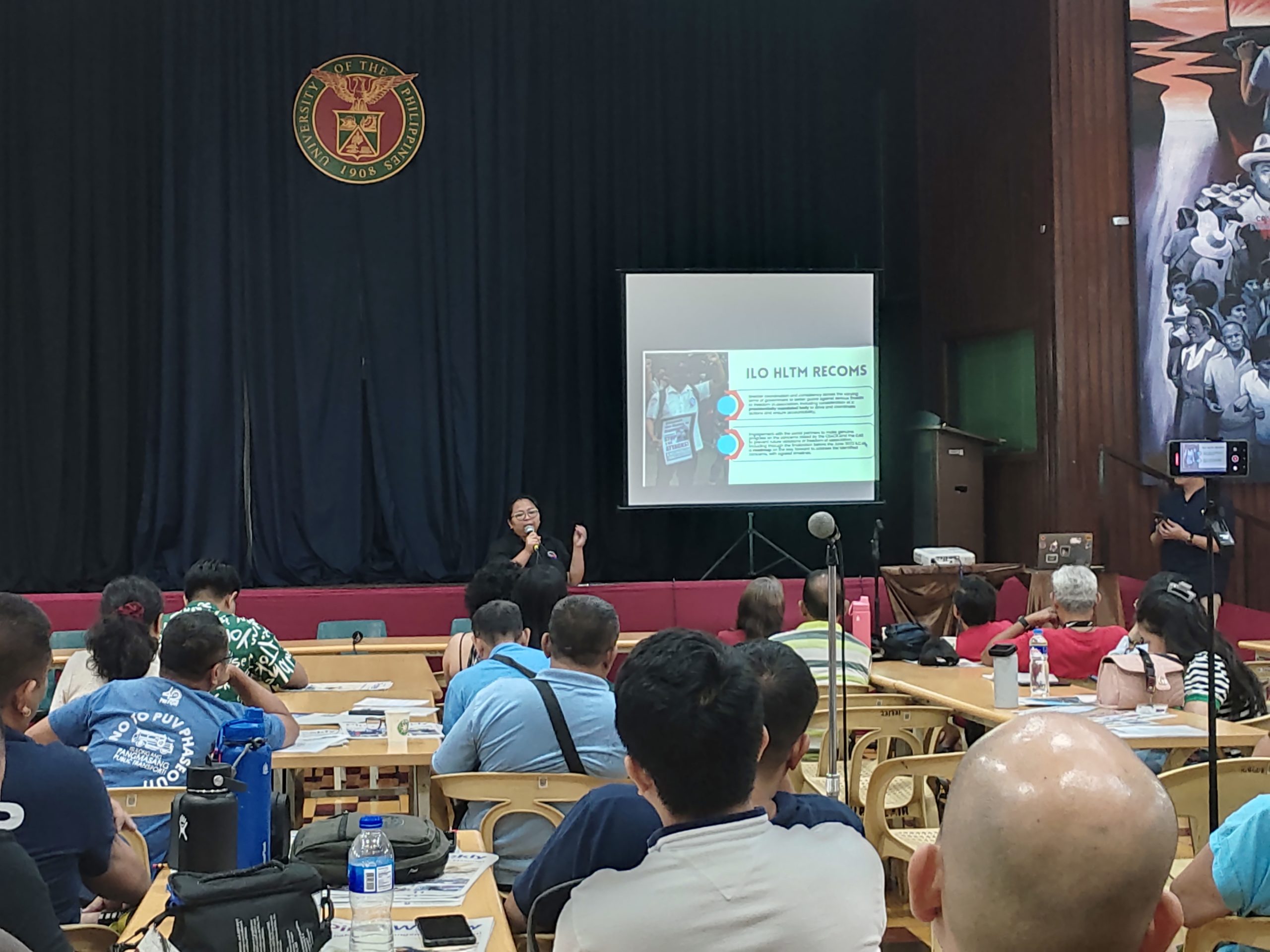
Kamille Pauline Deligente (from CTUHR) presented the highlights of the Omnibus Guidelines on Freedom of Association, stressing the importance of social dialogue and the need to prevent the labeling of workers and unions, which has been a significant issue due to red-tagging and profiling.
Furthermore, the guidelines outline administrative remedies that require evidence to support claims made by workers. The Department of Labor and Employment (DOLE) is mandated to address the grievances of workers, ensuring that their concerns are taken seriously and acted upon. This provision is crucial in creating a system where workers feel empowered to voice their issues without fear of retaliation or further victimization.
Deligente’s presentation underscores the urgent need for the Philippine government to implement these guidelines effectively. The ongoing issues of red-tagging and violence against union members highlight the systemic challenges that workers face in asserting their rights. By promoting social dialogue and preventing harmful labeling practices, the Omnibus Guidelines aim to create a safer and more equitable environment for workers in the Philippines.
Joy Hernandez (Senior Council Officer of ITUC-Asia Pacific) provided insights based on the Global Right Index, indicating that the Philippines consistently ranks among the worst countries for working people, with worsening conditions regarding workers’ rights.
The Global Right Index is a tool used to assess the state of labor rights across different countries, evaluating factors such as the right to organize, the right to collective bargaining, and the protection against violence and discrimination in the workplace. Hernandez’s assertion that the Philippines has a rating of “5” on this index underscores the serious challenges faced by workers in the country. A rating of “5” typically indicates a high level of violations of labor rights, suggesting that workers are not only facing systemic issues but also a lack of effective legal protections.
Hernandez points out that the situation is worsening, particularly in the context of increasing violence and red-tagging—where individuals or groups are labeled as terrorists or enemies of the state, often without evidence. This practice has been particularly detrimental to labor unions and workers’ organizations, leading to attacks and intimidation against union members. The implications of such violence are profound, as they create a climate of fear that discourages workers from organizing or advocating for their rights.
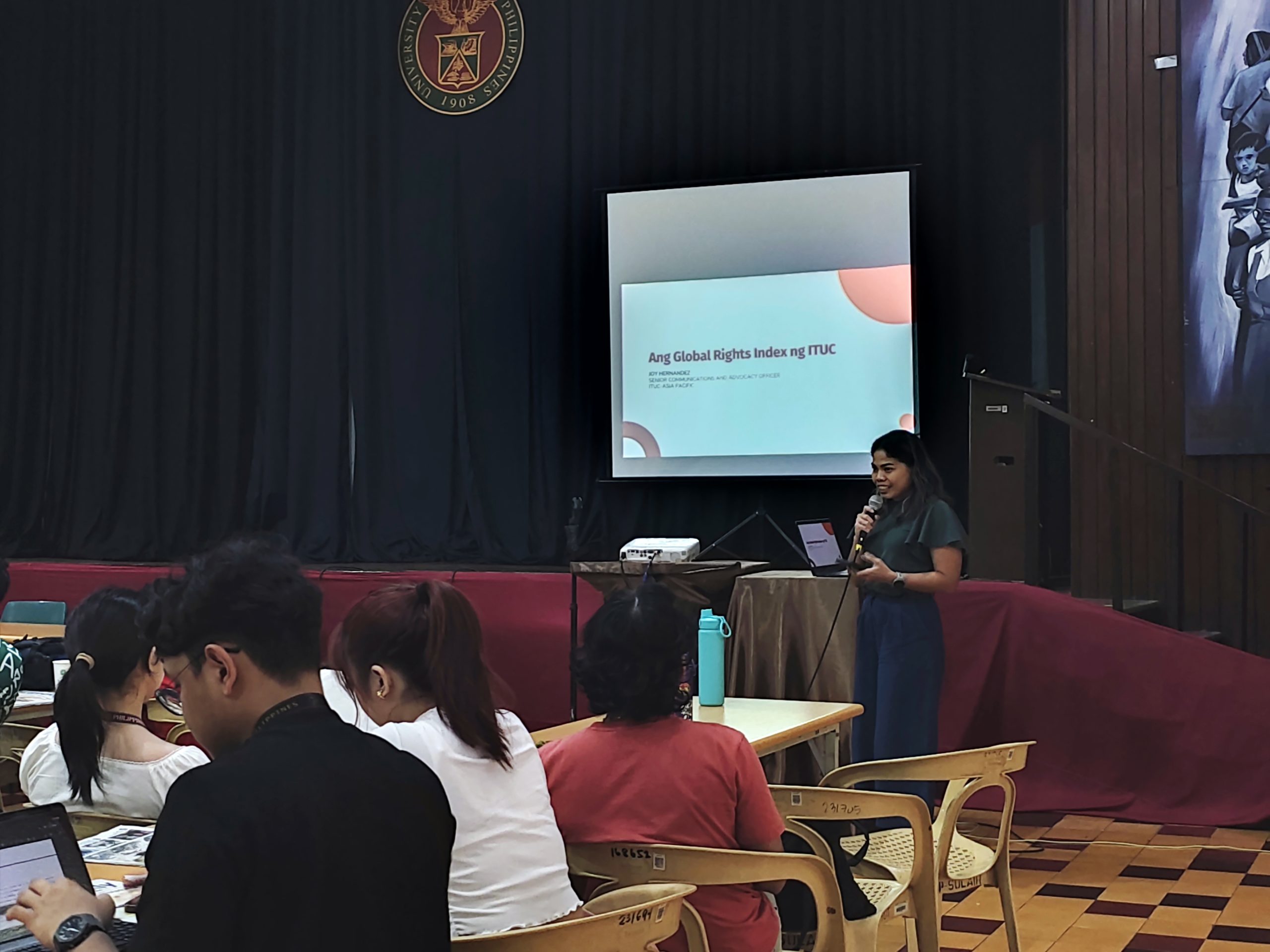
Joy Hernandez (Senior Council Officer of ITUC-Asia Pacific) provided insights based on the Global Right Index, indicating that the Philippines consistently ranks among the worst countries for working people, with worsening conditions regarding workers’ rights.
Moreover, while there are laws in place intended to protect workers, Hernandez notes that these laws are often not enforced in practice. This gap between legislation and enforcement highlights a critical issue in the labor rights landscape in the Philippines. The lack of accountability for violations of workers’ rights contributes to a culture of impunity, where employers may feel emboldened to disregard labor laws without fear of repercussions.
Hernandez’s insights are further supported by discussions surrounding the Omnibus Guidelines on Freedom of Association, which aim to address some of these issues by promoting social dialogue and preventing the labeling of workers and unions. However, the effectiveness of these guidelines remains to be seen, especially in light of the ongoing violence and systemic violations of rights.
Atty. Sonny Matula (from FFW) discussed the aftermath of the High Level Tripartite Mission of the International Labor Organization, addressing ongoing violations of the right to freedom of association and the need for effective investigations into violence against workers.
The ILO-HLTM noted with deep concern the serious and systemic violations of the right to freedom of association in the Philippines. This includes the suppression of workers’ rights to organize, join unions, and engage in collective bargaining without fear of retaliation or violence. The situation is exacerbated by the prevalence of red-tagging, where individuals or groups are labeled as communists or terrorists, often leading to harassment and violence against union members and labor activists. He emphasized the urgent need for effective and independent investigations into recent and historical cases of violence against workers. The ILO has called for immediate measures to address these violations, which have persisted since 2015.
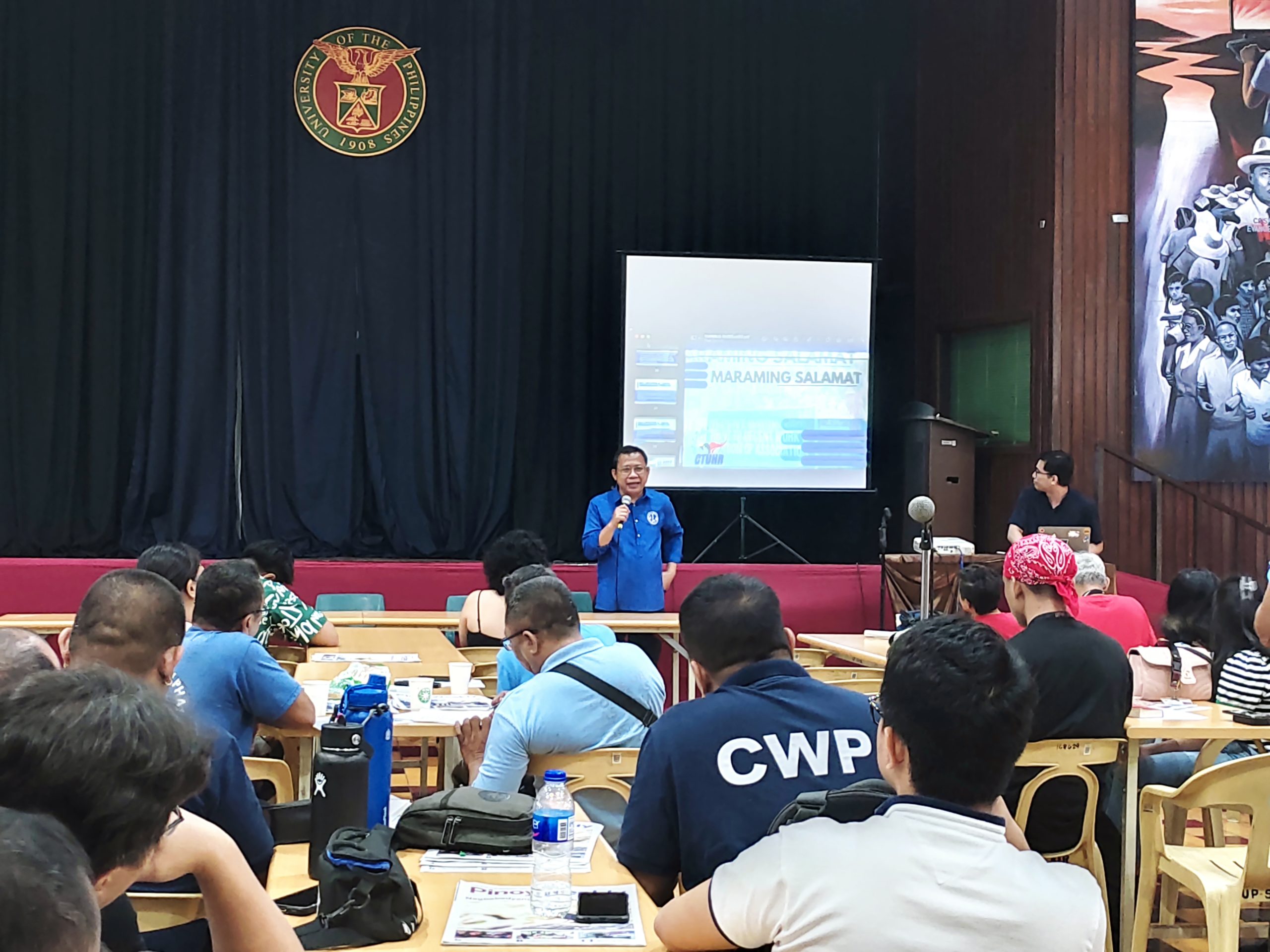
Atty. Sonny Matula (from FFW) discussed the aftermath of the High Level Tripartite Mission of the International Labor Organization, addressing ongoing violations of the right to freedom of association and the need for effective investigations into violence against workers.
The lack of expeditious and effective investigations into killings and violence against labor leaders and activists has created an environment of fear and impunity, further discouraging workers from exercising their rights. The ILO made several recommendations to the Philippine government, urging it to take effective measures to implement previous recommendations and to ensure that investigations into violence are thorough and independent. This includes addressing the root causes of violence and ensuring that workers can freely associate without the threat of violence or intimidation. He also pointed out the government’s failure to adequately consult with stakeholders regarding Executive Order 23, which has implications for labor rights. The lack of consultation reflects a broader issue of neglecting the voices of workers and their representatives in policymaking processes.
The discussion served as a call to action for both the government and civil society to prioritize the protection of workers’ rights. Atty. Matula’s insights underscore the need for a collaborative approach to address these challenges, involving dialogue between the government, employers, and workers’ organizations.
Joanne Cesario (from KMU) analyzed key issues under the Marcos Jr. administration, including the implications of U.S. military presence in the Philippines and its impact on workers’ livelihoods.
Cesario’s analysis is the increasing military aggression in the West Philippine Sea, which she argues is exacerbated by the involvement of the U.S. military. The Philippines has been drawn into a geopolitical conflict, with the U.S. acting as a provocateur against China. This military presence is not merely a matter of defense; it has significant socio-economic repercussions for the Filipino people, especially workers. She highlights that while the government engages in discussions about military strategy and territorial integrity, the fundamental issues of workers’ rights and livelihoods remain unaddressed.
The analysis points out that despite the ongoing discussions about military alliances and defense strategies, Filipino workers continue to struggle with inadequate wages. She notes that the wages of Filipino workers are often only half of what is considered a living wage in the National Capital Region (NCR). This disparity indicates a systemic failure to address the economic needs of the workforce, which is further compounded by the government’s focus on military matters rather than social welfare.
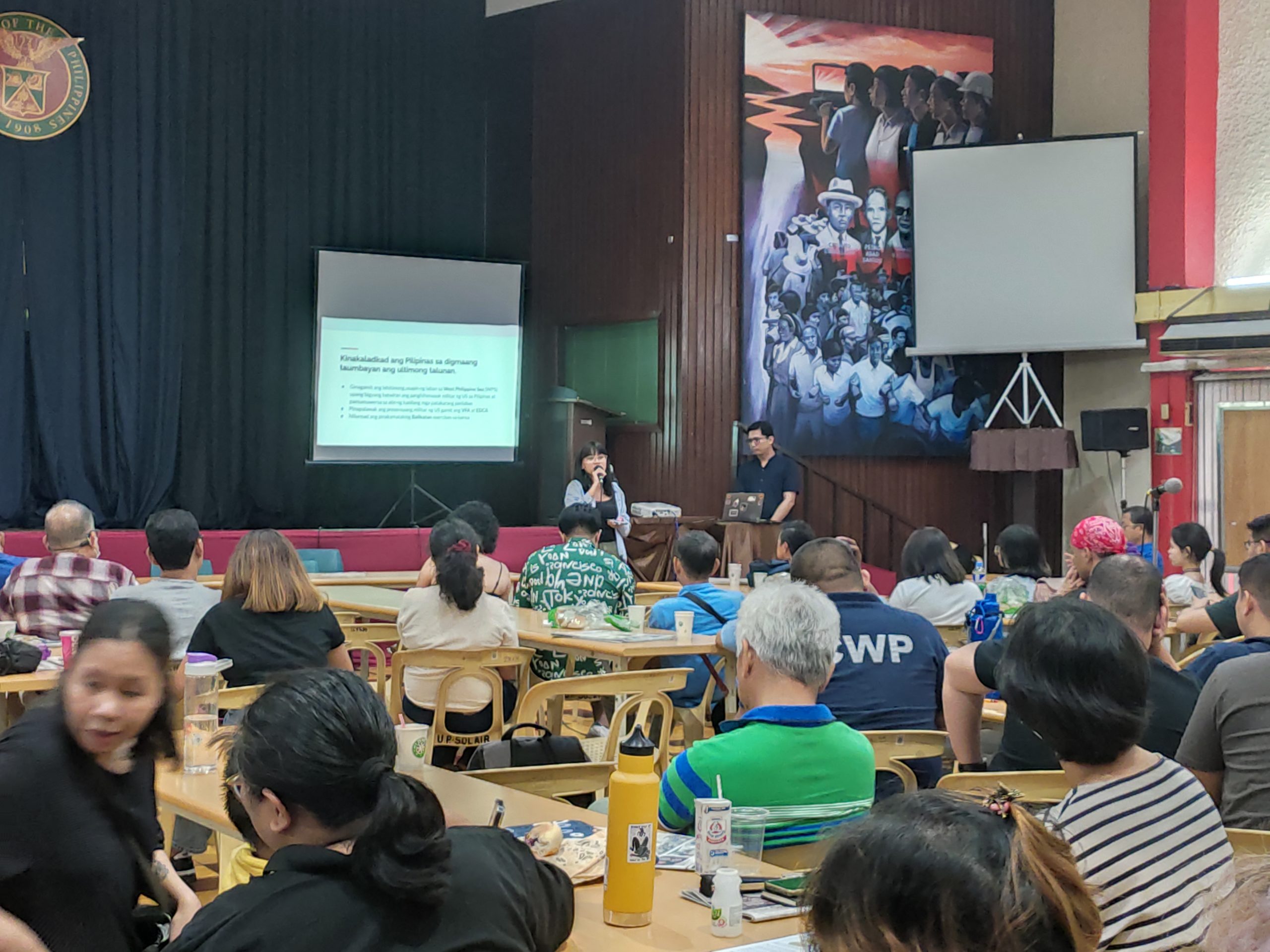
Joanne Cesario (from KMU) analyzed key issues under the Marcos Jr. administration, including the implications of U.S. military presence in the Philippines and its impact on workers’ livelihoods.
Moreover, Cesario emphasizes the ongoing issues of contractualization and the rise of informal labor, which have led to increased job insecurity and a growing number of unemployed individuals. The government’s reluctance to raise wages and improve working conditions is evident, as repeated hearings by the Committee on Labor Employment have yielded no substantial changes. This stagnation reflects a broader trend where the interests of capitalists and lawmakers take precedence over the welfare of workers.
In her analysis, Cesario also touches on the rivalry between the Marcos and Duterte administrations, particularly regarding issues of corruption and human rights violations, such as the War on Drugs. The implications of these policies extend beyond immediate violence; they create an environment of fear and repression that stifles workers’ rights and their ability to organize for better conditions.
Conclusion
The current labor landscape in the Philippines is fraught with challenges that necessitate a call to action for collective organizing and uniting among workers and various sectors. The issues of low wages, job insecurity, and the violation of labor rights are not isolated; they are interconnected and require a concerted effort to address them effectively.
For instance, the real wage is alarmingly low at only 573, which is insufficient to meet even the minimum living standards. Despite high labor productivity, wages remain stagnant, leading to a situation where workers are often classified as “cheap labor.” This disparity indicates a systemic problem where the benefits of productivity are not equitably shared with the workforce. Moreover, the labor market is characterized by precarious employment conditions, with many jobs being seasonal and heavily reliant on the service sector. This situation is exacerbated by the underrepresentation of women in the labor force and unions, which further complicates the fight for equitable labor rights. The collective bargaining agreements (CBAs) are essential tools for workers, as they establish minimum wages, benefits, and working conditions. However, the enforcement of these agreements is often lacking, and many workers remain unaware of their rights. The phenomenon of red-tagging and violence against union members adds another layer of complexity to the labor struggle. As highlighted in the discussions, there is a pressing need for the government to uphold the rights of workers and ensure that laws designed to protect them are effectively implemented. The International Labor Organization (ILO) has urged the Philippine government to enhance social dialogue among stakeholders to resolve these pressing issues.
In light of these challenges, there is an urgent need for collective action. Workers must unite across various sectors to advocate for their rights and push for systemic changes. This involves organizing grassroots movements, forming alliances with other marginalized groups, and engaging in dialogues that promote labor rights and social justice. Collaboration with various sectors—such as civil society organizations, academic institutions, and political entities—can amplify the voices of workers and create a more formidable front against injustices. By pooling resources and knowledge, these collaborations can lead to more effective advocacy campaigns that address the root causes of labor issues.
“By uniting and organizing, workers can challenge the status quo, advocate for their rights, and strive for a more just and equitable society. The time for action is now, and it is imperative that all stakeholders come together to support this vital cause.”
About the author:
Mark Darwin Santos is taking up Bachelor of Arts in Philippine Studies at the Polytechnic University of the Philippines. He is passionate about understanding and investigating the concrete conditions of the Filipino workers.
